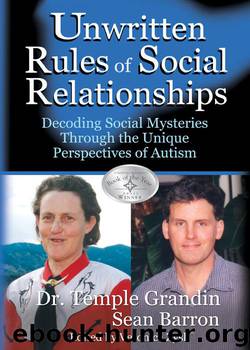The Unwritten Rules of Social Relationships: Decoding Social Mysteries Through the Unique Perspectives of Autism by Grandin Temple & Barron Sean

Author:Grandin, Temple & Barron, Sean [Grandin, Temple]
Language: eng
Format: mobi
ISBN: 9781935274476
Publisher: Future Horizons
Published: 2012-10-01T04:00:00+00:00
As with all the rules and the personal experiences offered throughout this book, our goal is to open your mind to new ways of understanding people with ASD, how we think and how that thinking affects our ability to function within the social framework around us. The goal for most parents and teachers in doing so is to guide spectrum children towards an adult experience that includes independence, a satisfying job and meaningful social relationships. We’ll all make mistakes along the way, and hopefully, we’ll all keep in mind this unwritten rule of social relationships: what matters more than the mistake you make is what you do once you realize you’ve made it. For Sean, he’s learned that in many instances, laughing at our own mistakes puts them in perspective quicker than anything else.
Sean shares:
I want to add a few points about laughter with regard to mistakes. I’m not talking about situations for which a serious response would be appropriate. Obviously, if you’re in a supermarket, for example, and you accidentally clobber someone coming around a corner with your shopping cart, laughing it off would not be the right thing to do. Apologizing and making sure the person is okay are the right ways to handle such an incident. Once you have done that, then laughter may be all right, depending on the person’s response and frame of mind.
It’s also important to distinguish between what I call good versus bad laughter. By this I mean the difference between laughing with someone (or at what the person said when humor was the intent) and laughing AT the person.
To dig up one other cliché (and quickly return it to its resting place where it belongs), laughter is contagious. I’ve been in festive social situations where the mood is jovial and people are having a great time laughing, conversing, etc., and have found myself doing the same—even if nothing funny was said to trigger it. I get caught up in the mood and respond in kind. Likewise, there have been countless occasions at which I have laughed when someone was trying to be funny. Laughter is one of those things that has a way of feeding off itself.
Laughing at someone, on the other hand, usually causes the opposite reaction. This is hurtful and inappropriate. It’s when, for instance, you laugh at a funeral. It’s when you laugh after a person trips—or any situation and set of circumstances that causes a person embarrassment or other negative feelings when that person wasn’t trying to be funny. Laughing at people is akin to making fun of them, and nobody enjoys that.
By and large, however, most garden variety mistakes and situations in our everyday lives lend themselves to a little humor if we’re willing to “let our hair down.” And making fun of yourself in a humorous way is always more attractive to people than subjecting them to your self-righteousness or your heavy negativity. I find it hard to be around someone who is angry, sullen or upset most of the time and who often complains but does nothing to change anything.
Download
This site does not store any files on its server. We only index and link to content provided by other sites. Please contact the content providers to delete copyright contents if any and email us, we'll remove relevant links or contents immediately.
The Out-of-Sync Child by Carol Stock Kranowitz(2054)
The Gender Creative Child by Diane Ehrensaft & Norman Spack(1800)
Aspergirls by Rudy Simone(1699)
Your Soul's Plan by Robert Schwartz(1690)
Be Different by John Elder Robison(1650)
My Child's Different by Elaine Halligan(1517)
101 Tips for the Parents of Boys with Autism by Ken Siri(1495)
The Sensory Child Gets Organized by Carolyn Dalgliesh(1448)
Meditation: Meditation For Beginners - How to Meditate For Lifelong Peace, Focus and Happiness (Mindfulness, Meditation Techniques) by Price Sara Elliott(1448)
Asperger Syndrome (Autism Spectrum Disorder) and Long-Term Relationships by Ashley Stanford(1427)
ADHD by Mark Selikowitz(1394)
An Adult with an Autism Diagnosis by Gillan Drew(1355)
Nerdy, Shy, and Socially Inappropriate by Cynthia Kim(1352)
Animal-assisted Interventions for Individuals with Autism by Temple Grandin(1332)
The Yoga Bible by Christina Brown(1324)
Seeing Ezra by Kerry Cohen(1307)
Somebody Else's Kids by Torey Hayden(1264)
Baby Signing for Dummies by Jennifer Watson(1260)
The Complete Guide to Asperger's Syndrome by Tony Attwood(1241)
